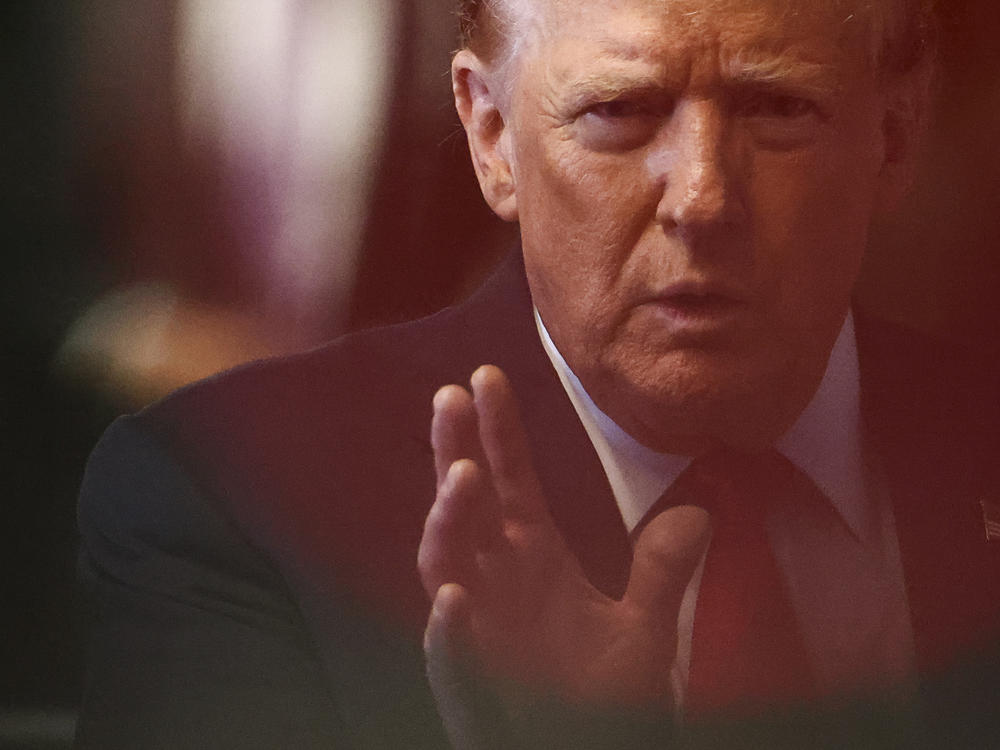Section Branding
Header Content
Closing arguments for Trump's trial have been made. What now?
Primary Content
Nearly two dozen witnesses and 22 days of court later, Donald Trump's New York hush money trial is coming to a close.
It was the first time in American history that a former president was on trial as a criminal defendant.
Trump faced 34 felony counts alleging that he falsified New York business records in order to conceal damaging information ahead of the 2016 presidential election.
The jurors had been listening to witnesses like adult film actor Stormy Daniels, and Trump's former fixer Michael Cohen. And when it came to Trump himself, he continued to be outspoken on his point of view, violating a gag order for the case multiple times, calling the entire process, "a concerted witch hunt" and a case that "should have never been brought."
You're reading the Consider This newsletter, which unpacks one major news story each day. Subscribe here to get it delivered to your inbox, and listen to more from the Consider This podcast.
Examining the closing arguments.
On Tuesday, those 12 jurors heard closing arguments from the prosecution and defense.
With those final impressions in mind, jurors will decide whether Trump will be convicted or acquitted of falsifying business records.
Adam Shlahet, a jury expert and a professor at Fordham Law School in New York, says there are two types of closing arguments in a case like this.
"One is what a white-collar criminal defense attorney would do in this case, which is a precise, strategic, very clear case theory closing argument," he said.
Or, as Shlahet explains: "The closing argument that Donald Trump wants, which is more of a scorched earth kind of closing argument, where everyone's a liar, everyone's out to get the president."
Shlahet thinks Tuesday's argument made by Trump's lawyer, Todd Blanche, was a mixture of both. He says while Blanche wanted to focus on convicted liar Michael Cohen.The defense just didn't really have a story to tell. The closest thing they had to a story was, 'Trump didn't know what he was signing. Even if he did know what he was signing, it was perfectly legitimate legal expenses.' And that's just not all that compelling."
In a move that shocked Shlahet, Blanche's closing argument stated that the judge should not send Trump to prison over what had occurred.
"That is something that a first-year assistant district attorney, a first-year criminal defense attorney — they know that you are not supposed to talk about potential sentences during a closing argument or any time during the trial, because the jury is not supposed to be considering what the punishment is going to be. They're only supposed to be considering the facts and whether or not somebody is guilty or not guilty of a crime."
Shlahet says that by Blanche saying this, he is almost asking the jury to nullify whatever verdict they were going to give.
What the jurors do next.
NPR's Andrea Bernstein has been in the courtroom each day, reporting on the play by play of the trial and what each side has argued in their case.
"This was the moment for each side to link everything up for the jury — all the bits and pieces they've heard over the last five weeks," she told All Things Considered host Juana Summers on Tuesday.From now, jurors will weigh evidence, including documents like phone records, invoices and checks, as they try to reach a verdict. Trump has pleaded not guilty. The verdict must be unanimous.
If all 12 jurors can't agree, the jury is considered "hung," and the judge will declare a mistrial. The district attorney prosecuting the case would then have to decide whether to try the case again.
Overwhelmed by all the details? Listen to the full episode of Consider This to hear more from Bernstein's first hand reporting by clicking the play button at the top of the page.

